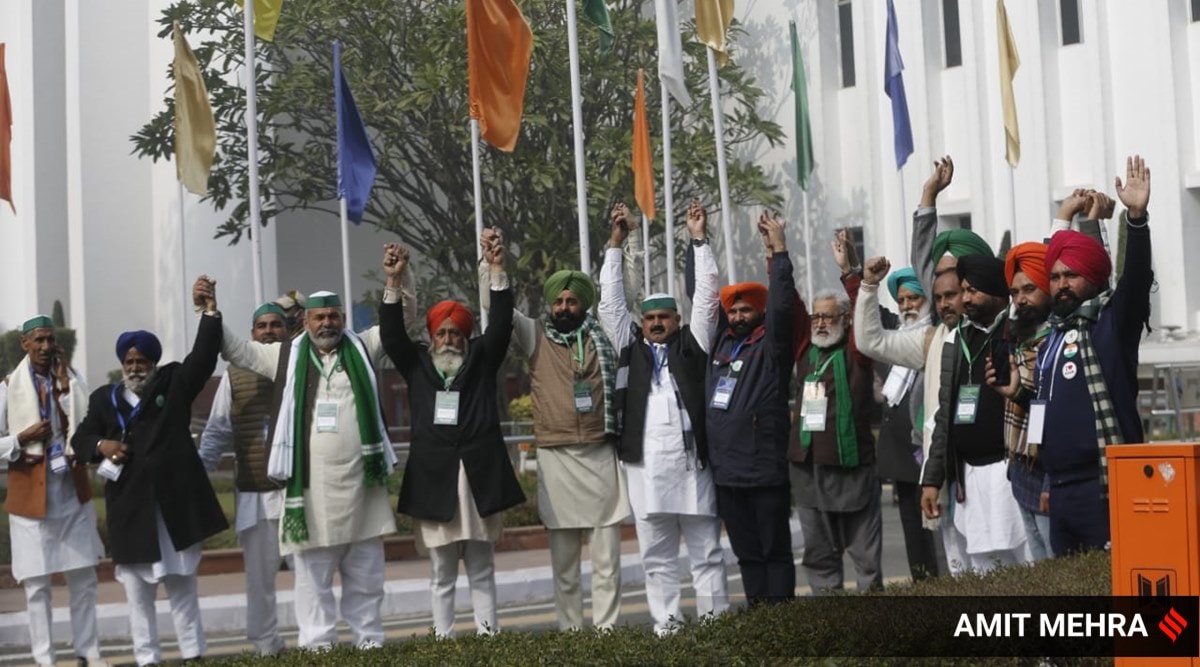 Farmers have been protes
Farmers have been protes *Are you aware about the implications of legalising MSP?
*Do you think there may be risk of acquiring land by the corporate sector or the contractor?
*There are apprehensions that the provisions in the Act will collapse APMC markets. Do you feel so?
*If yes, how will it be responsible for the collapse of APMC markets?
These are some of the questions in a feedback form prepared by the Supreme Court-appointed committee seeking “suggestions” of farmers and other stakeholders on the three contentious farm laws and the demand for legal guarantee for minimum support price (MSP).
The feedback form, available on the committee’s webpage, contains 20 multiple-choice questions divided into 5 sections. While Sections A, B, and C deal with the three farm laws, Section D contains questions on the MSP. The last section, E, seeks the respondents’ suggestions.
The first of the eight questions in Section A asks if the farmers/stakeholders are aware of the Farmers’ Produce Trade and Commerce (Promotion and Facilitation) Act, 2020 — to be answered in a ‘Yes’ or ‘No’. In the next question, farmers are asked where they sell their produce — a farm gate, haat (market), an APMC mandi, a collection centre, a collection organised by a company or a farmer producer organisation.
Section A goes on to ask if the respondents feel the Act gives them more choice to sell their produce beyond APMC markets, and if this would “benefit farmers in realizing better prices for their produce”.
The form tackles apprehensions among the farmers regarding the Acts — including the uppermost one that they may lead eventually to dismantling of the APMC mandis. The committee asks if the respondents feel so and, if they do, to explain why in no more than 50 words.
Earlier, in talks with the farmers, the government had proposed changes to the laws to bring parity in transactions inside and outside mandis, so that these didn’t become obsolete as feared. In a proposal sent to the farm unions on December 9, the Centre said, “By amending the Act, it can be provided that the state government can implement the system of registration of private mandis. Also, the state government can fix the rate of cess/fee, to be collected from such mandis, up to the rate of cess/fee applicable to the existing APMC mandis.”
The last question in Section A takes on farmers’ fears regarding a provision related to dispute resolution mechanism under the new laws. “How (is) the dispute to be resolved between buyer and seller? Do you think the existing provision through SDM (sub-divisional magistrate) will serve the purpose?” the question says.
Section B has five questions regarding the Farmers (Empowerment and Protection) Agreement on Price Assurance and Farm Services Act, 2020, including, “Are you aware about the Act dealing with contract farming?… Do you know the Act is (a) contract for produce and not for land?… Do you think that there may be risk of acquiring land by the corporate sector or the contractor?… Do you agree with the dispute resolution through SDM under the Act?… Do you have any suggestions to further improve the provisions in the Act?”
Section C contains three questions about the Essential Commodities (Amendment) Act, 2020, on whether the farmers are aware of its provisions and how these affect them, and the changes they would like.
The MSP issue is dealt with in Section D, in four questions — “What are the three main produce you sell? Do you sell your produce at Minimum Support Prices? (To) Whom do you sell? Are you aware about the implications of legalizing MSP especially if the commodity is in surplus… If yes, what may be those?”
In the last Section E, the respondents can give “any other suggestions” in 100 words.
The portal requires the respondents to share details such as name, email, mobile number and state.
The Supreme Court had constituted the committee to try break the deadlock between the farmers and the government, while putting the three farm laws on hold. Since then, the government has offered to hold the laws in abeyance for one-and-a-half years. The farmers have rejected both the committee and the government’s offer, saying they want nothing short of repeal of the laws and legal guarantee for MSP.